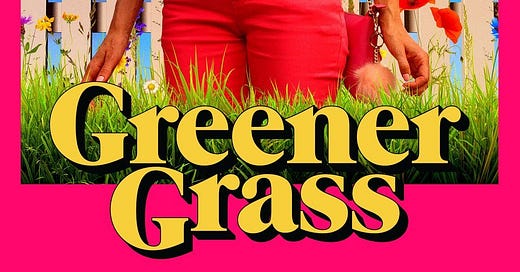On the other side of sanity lies Greener Grass, the delirious brainchild of the writing/directing/starring duo of Jocelyn DeBoer and Dawn Luebbe. They meticulously render a farcical simulacrum of suburbia where every adult has braces and drives golf carts. These peculiarities, and so many more, go unremarked by the film. Oddities pervade a picturesque world that defies reason but demands conformity.
Jill Davies (DeBoer) is the ideal housewife: pretty and desperate to please. When four carts converge at an intersection, the collective propensity for politeness leaves them at an impasse. “You were here first,” Jill signals to the other drivers, “I’m never first.”
Jill is the envy of friend and fellow soccer mom, Lisa Wetbottom (Luebbe). When Lisa tells Jill that the local yoga teacher was murdered the night before, Jill gasps. She didn’t know the victim, she’s “just really been wanting to start doing yoga.” Upon hearing that the murder suspect bagged groceries at the local supermarket, Jill remarks, “I’m sure I have groceries in my cupboard that he touched.” Lisa replies, pointedly, “I bet I have some in my trunk.”
Constant competition underlies social dynamics and beneath each mother’s strained, brace-faced smile lurks envy, dissatisfaction, and solipsism. Saturated colors and soft, gauzy lighting clash with an unsettling soundscape. Within the dizzying dissonance lies the brilliance of this absurd fever dream of a film. Jill’s gradual descent into a sobering psychosis is an unexpectedly uproarious delight. Like it or not, you’ve never seen anything like Greener Grass.




